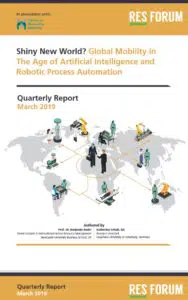The Digitalization of Global Mobility
Digitalization of HR is a much talked about subject which has trickled down into the world of Global Mobility.
We are talking with employers and their Global Mobility teams who are seeking new ways to reduce the impact of assignment administration and create efficiencies.
There are many platforms available in today’s market, offering different ways to support Global Mobility programs. From complex all-in-one systems, to smaller applications which are focused on more specific tasks linked together together via API integration. Add to this, daily new developments in voice recognition, robotics and AI landing in our laps (quite literally), the potential for their use feels boundless.
Depending on your requirements, budget and the complexity of your mobility program, you now have more choice than ever before. This has left many HR and Global Mobility professionals considering how this can be utilized in their business.
This report has been written to help guide Global Mobility on the latest developments. You can download the report at the bottom of this page.

The use of AI Artificial Intelligence and Process Automation in Global Mobility
This report, published by RES Forum, explores the practical application of new technologies such as AI and robotics can potentially be used by Global Mobility and how it can be used as part of a broader digitalization strategy. The report opens by identifying the rise in popularity of home devices such as Alexa, Siri and Google Home signalling the acceptance of AI.
It looks at how automation of processes and robotic programming present a great opportunity for HR and Global Mobility to reduce administration related to routine tasks. It asks how practical is it to use? And how much investment is required in setting this up?
Our View on Opportunities Within Relocation And Moving
At Gerson Relocation, like many relocation companies, our service is focused on the customer experience and ways we can continually improve this. As such we have been utilising these automation in this area for some time, helping to simplify tasks and to help reduce administration. For example, online initiations are used to trigger a sequence of events within our management systems. Exception management processes can be set to automatically trigger. The relocation and move processes we have developed are also built into our software to automate key actions, prompting when tasks need to be completed and generate communications by email and text. All of this has gone some way towards reducing administration. Looking ahead we want to do more.
Looking ahead, voice recognition and AI are now becoming a lot more capable and accessible, which means we have the opportunity introduce new functionality. AI driven chatbots can help with online customer experiences, visitors to our portal can receive help from a virtual assistant to help direct them to the information they need. You may not need to tap any buttons to access your account either, it could recognise your voice and provide updates via voice control.
In our opinion, APIs are probably the greatest gift to Global Mobility and technology today. The ability to link multiple specialist applications and technologies into a coherent technology system is extremely powerful and compelling. If you have an idea of your overall plan, the overall cost of your technology can be reduced and implementation times can be quicker too.
HR and Global Mobility are complex and human
One point that must be reiterated is that Global Mobility is arguably one of the most complex functions within HR and indeed international business. The interplay between international business units, often on different business systems, working within different jurisdictions, legal structures and cultures. This makes things tricky although not impossible.
Global Mobility is also broad in its nature and has to support employees and families with complex needs. Therefore, the challenge is set – where will AI and automation be able to positively impact Global Mobility and enhance the UX?
If we are to digitalize Global Mobility, then we should also look to other areas of our businesses and external markets to see how they have achieved digitalization. Next, we need to find a starting point, rather than trying to eat the whole thing at once, perhaps we should find an easy place to start and take it one byte at a time.
Available now – the 2018 RES Forum Global Mobility Quarterly Report 2019
Download the RES Forum report on Global Mobility in the age of artificial intelligence and robotic process automation for free with Gerson Relocation.
As part of the Harmony Network, Gerson Relocation is a part sponsor of the RES Forum series of Global Mobility reports. If you are interested in how technology can benefit Global Mobility and relocation, you can download the research for free below and see the recommendations.
Complete the form below to download the report:
About the RES Forum
The RES Forum is an independent, highly engaged and international community of senior inhouse International Human Resources professionals with more than 1600 members in over 45 countries. We are not influenced by external parties or third-party vendors. We share information to make our working lives easier and to assist in solving difficult work challenges. We collaborate on shared projects and initiatives, and we learn together. Our agenda, set entirely by our membership, is delivered through a spectrum of services including member information exchange, custom research, professional consultancy and training and a full schedule of events held around the globe.




